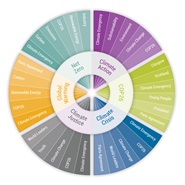A Closer Look at Product Governance ESG Risk Management
In 68% of our engagements, product governance is a significant material ESG issue, but it is our experience that most companies underestimate the materiality of this risk to investors. For some industries, product governance represents on average more than 20% of ESG risk exposure, as identified within our ESG Risk Rating framework.
Sustainable Finance and Banks: Reduced Risk, Increased Opportunity
Banks will play a key role in the green transition and those that commit to sustainable banking may gain an advantage over competitors, among other benefits. Indeed, banks are uniquely positioned to participate in and benefit from the transition to a green economy.
COP 26: A Spotlight on Emerging Climate Action Themes for Investors
Reactions to the COP26 Conference and the resulting Glasgow Climate Pact have predictably run the gamut from claims of greenwashing to the celebration of progress in the fight against climate change. Ultimately, any judgement on COP26 may be premature, as the success of the conference will best be measured in time by the extent to which commitments made are put into motion. While we wait to see the concrete actions that materialize, the past two weeks have underscored the importance of several themes that will garner increasing attention and should be considered by sustainable investors.
The Impact and Cost of Air Pollution: U.S. Petroleum Refineries
Investors can examine to what extent petroleum refiners manage their Non-GHG Air Emissions and assess the quality of a company's programs to reduce air pollutants. For instance, examining all the petroleum refiners assessed by Sustainalytics, we observe that only 3% have a strong program to manage non-greenhouse gas emissions.
Momentum Around Principal Adverse Impact Data Remains Strong Despite SFDR Delays
Despite the shifting timelines, we observe that the market momentum around PAIs is not diminishing, quite the contrary. Investors in the scope of the regulation are using the fourth quarter of this year to get acquainted with PAI data and set up their systems. Most investors we speak with want to be prepared in time to be able to monitor PAIs throughout 2022 and adjust their portfolios to boost their PAIs (or rather limit the downside, as these are adverse impact indicators). This means that PAIs may significantly impact stock selection and portfolio construction by fund managers keen to have ‘good’ PAI scores.
SFDR and EU Taxonomy Product Disclosure Rules Finally Released
The publication of these rules marks the end of a prolonged period of uncertainty in the market around final rules and timelines - assuming the RTS will be adopted as-is in a Delegated Act, which turns these rules into regulation. There are several noteworthy aspects to these rules, which we address from our perspective in this article.
Biodiversity: A Crisis Equaling, Possibly Exceeding, Climate Change
According to the UN’s Convention on Biological Diversity the main drivers of biodiversity loss are habitat loss and degradation, climate change, pollution, over-exploitation, and invasive species. Habitat loss is directly linked to the conversion of natural ecosystems to agricultural lands and unsustainable use of water resources.
Bringing Investors and Companies Together to Accelerate Human Rights Progress
Human rights issues have been rising on the responsible investment agenda in recent years. The COVID-19 pandemic and the Black Lives Matter movement have provoked even more pointed discourse on the topic. The European Union’s current efforts to introduce rules to hold companies accountable for social and environmental risks in their supply chains further accelerate that ascent. This wave of legal requirements and normative expectations is impacting financial markets worldwide, with responsible business regulations already in place or quickly becoming valid.
Know Where You Stand With Corporate ESG Benchmarking
In this post we discuss why companies should generate a corporate ESG benchmark against their peers, explain how they can go about this exercise, and highlight how they can use that information to advance and enhance their own corporate ESG initiatives.
Impact of Climate Change and Extreme Weather on Essential Services
Utilities have found themselves in the literal and metaphorical eye of the storm over the last year as hurricanes, floods and wildfires of increasing frequency and strength have wreaked damage on their assets. In late August, Storm Ida made landfall in Louisiana, USA and devastated the power grid lines. Entergy, the utility operating in Louisiana, supplying most of New Orleans, restored 90% of the supply only by mid-September, with 87,000 customers still without power.
The circular way forward could be the key to reducing food waste
Indications that a food crisis is imminent are clear. Fundamental changes in the global food system are required to address these challenges. This decade is a watershed moment for urgent efforts to close the loop, and companies and investors can play a pivotal role. Despite being closely connected to issues such as climate change and basic human rights, food waste has attracted comparatively less attention from companies, investors, and other stakeholders.
Recent market trends put engagement and voting front and centre for responsible investors
From a market perspective, engagement and voting on governance issues have been used as levers for influence for a long time. On the other hand, environmental and social issues were historically addressed from a values-based perspective or primarily for fact-finding purposes. Today, many responsible investors leverage corporate dialogue as a tool to influence and drive meaningful change and impact
North American Material Risk Engagement Trends: ESG Reporting Frameworks, Emission Reduction Targets and Beyond
There are many factors that rating agencies consider within its overall assessment. For example, ESG rating companies tend to look for at least three years of ESG metrics to determine company trends and long-term ESG targets, goals, and strategies to manage and reduce ESG risks at least five years ahead. Read on to learn about how Sustainalytics' Material Risk Engagement program promotes and protects long-term value by engaging with high-risk companies on financially-material ESG issues. (A North American Snapshot)
Sustainability-Linked Debt Financing: The View from Down Under
For Australia, a country whose economy is historically rooted in heavy-emitting, hard-to-abate sectors, sustainability-linked debt financing could provide the spark needed to accelerate emission reductions and transition to a low-carbon economy.
ESG Risks of Aging Pipelines for U.S. Energy Infrastructure Investors
Pipelines play a critical role in the U.S energy infrastructure transporting natural gas, crude oil, natural gas liquids, petroleum, and petrochemical products. While these pipelines play a vital role in supporting the U.S economy, investors are increasingly scrutinizing pipeline operators' long-term economic profitability and sustainability practices. A closer look into the status of pipelines reveals a particular issue that investors need to consider.



















